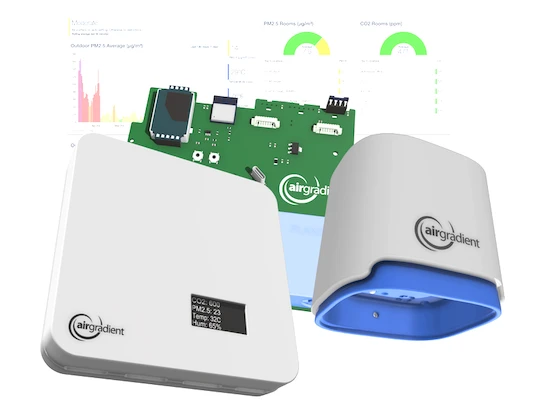AirGradient Open Source Air Quality Monitors
We design professional, accurate and long-lasting air quality monitors that are open-source and open-hardware so that you have full control on how you want to use the monitor.
Learn MoreAirGradient was born from a simple, powerful idea: that anyone should be able to measure their air quality. It grew organically, a grassroots movement fueled by citizen scientists, educators, and health-conscious individuals. Through the passion of our community, we have become what is arguably the fastest-growing low-cost air quality monitoring network in the world, built on a foundation of open-source principles and a desire for shared data.
Alongside our journey, another model for building decentralized networks has gained significant momentum: DePIN, or Decentralized Physical Infrastructure Networks. This paradigm shares our belief in the power of a distributed network, but it’s built on a different foundation. As a company deeply rooted in our community and our mission, we believe it’s important to share our perspective on the promise of DePIN, its potential pitfalls, and where AirGradient stands.
At its core, a DePIN project uses crypto-economic incentives to build real-world infrastructure. The model is straightforward: an individual buys a piece of hardware and connects it to the network. In return for contributing a steady stream of data, they are rewarded with the project’s cryptocurrency tokens.
We saw this with networks like Helium, which demonstrated the power of this model by deploying hundreds of thousands of wireless hotspots across the globe in just a few years—a scale that showcases the sheer power of crypto-economics in mobilizing a distributed workforce.
This incentive structure creates a community most likely with a different motivation from the one that built AirGradient. Our network, and the broader citizen science movement, is built on intrinsic motivation. With the World Health Organization estimating that 99% of the global population breathes air that exceeds its guideline limits, the drive to participate is clear and urgent. Our community is motivated by a desire to protect their family’s health, a deep curiosity about their environment, or a commitment to providing data for the common good. The reward is knowledge, impact, and a healthier community.
The DePIN world, in contrast, is often driven by extrinsic financial rewards. Often, the primary attraction for many participants is the potential for a return on their investment (ROI) through token earnings. While both communities are building valuable sensor networks, their foundational “why” creates a crucial divergence in values and outcomes.
I wonder if there is an overlap between these two worlds?
As we observe the DePIN space, we see a complex landscape with recurring challenges. A common misconception is that a “decentralized” network automatically means “open data.” We’ve found this is often not the case. Often, the blockchain is only used to manage token rewards, not to make the data itself open and accessible. This creates a data silo, undermining the very premise of a decentralized public good.
Furthermore, the financial incentive model presents a critical design choice for any DePIN: what behavior does the reward algorithm truly incentivize? A simplistic algorithm might naturally encourage sensors to be clustered in affluent areas where user adoption is high. However, a more sophisticated system could, in theory, be designed to do the opposite. It could offer boosted rewards for deploying sensors in underserved industrial zones or verified data deserts, effectively using market forces for public good.
This very potential, however, raises new questions. Who makes these crucial decisions about which areas are more valuable? Is it a centralized team of founders, or a decentralized governance vote by token holders? Or the demand by organisations that need the data from a specific geographic area. This highlights the inherent tension between optimizing for a financial system and executing a clear public health mission. This, combined with the speculative nature of crypto markets, means a project’s long-term stability is often tied more to token price than to the quality or impact of the data collected.
This reality has only strengthened our commitment to our core philosophy: we believe in empowering you, the owner of the device. When you purchase an AirGradient monitor, it is your hardware. The data it generates is your data. You must have the absolute and unconditional freedom to decide what to do with it.
This is engineered into our platform. You have the choice:
We see DePIN as simply another one of these choices. It is your device, and it should be your decision. We believe you should have the opportunity to participate in a DePIN network if that’s what you want to do. Therefore, we will continue to enable integrations that give you this choice, putting the power firmly where it belongs: in your hands.
We know from experience that a single, high-quality open dataset can fuel dozens of independent scientific studies, inform new public health policies, and give communities the evidence they need to demand cleaner air. That is the ultimate return on investment for humanity.
This is a complex and fast-moving space, and we are just one voice in the conversation. As members of the AirGradient community, you are on the front lines of citizen science. We want to hear from you.
What is your perspective on DePIN? Have you participated in one? What are your hopes for how these networks could evolve, and what are your biggest concerns?
Please share your thoughts in our community forum. Your insights will help shape our path forward as we continue to navigate this exciting new frontier together.

We design professional, accurate and long-lasting air quality monitors that are open-source and open-hardware so that you have full control on how you want to use the monitor.
Learn MoreCurious about upcoming webinars, company updates, and the latest air quality trends? Sign up for our weekly newsletter and get the inside scoop delivered straight to your inbox.
Join our Newsletter